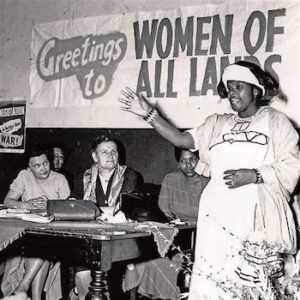
Florence Matomela (standing)
*Florence Matomela was born on this date in 1910. She was a Black South African activist, communist, and teacher.
From Port Elizabeth, South Africa, Florence Matomela raised five children while working as a teacher in the rural Eastern Cape. She also spent time in New Brighton township. Women's activism in rural areas was often neglected though the Eastern Cape played a vital role in activism. Due to the growing number of male migrations away from the rural Eastern Cape, many women needed more resources to sustain themselves and their children. The women sold their surplus produce to traders to purchase their basic needs. The women were mostly dissatisfied with the treatment they received from these traders due to few regulations.
These conditions led to a total boycott of trading stores in 1922, led by community members like Mrs. Annie Sodyiyo. The arrest of women from the community increased their solidarity, and ultimately, traders agreed to regulate prices. Matomela was exposed to female activists and rural political activity from a young age. These environments contributed to creating her into an influential politician. Political career Matomela was one of the first women to volunteer in the 1952 Defiance Campaign.
The stricter influx control measures and pass laws under the Native Laws Amendment Act implemented in 1952 made it an offense for any African to be in an urban area for longer than 72 hours without the necessary documentation. The only women permitted to live in townships were the wives and unmarried daughters of men with permits. For the first time, women were required to carry reference books. The reference book held the holder's identity, employment, place of legal residence, tax payments, and, if appropriate, permission to be in urban areas.
Many women were against this as it would remove their freedom of movement. Protests started when news of the new legislation was leaked to the press. After the influx, control regulations were implemented in Port Elizabeth. Matomela spearheaded a demonstration that resulted in the burning of passbooks—making this one of the first acts of the Defiance Campaign in the Eastern Cape. Matomela often appealed to women and other volunteers to join the African National Congress, ANC and drew in many members as the leading figure of the ANC at the time.
On June 26, 1952, she, Frances Baard, and other activists were arrested for entering the "Europeans only" section of New Brighton Railway Station in Port Elizabeth due to their participation in the Defiance Campaign. She spent six weeks in prison on a civil disobedience charge and was later tried again and given a nine-month suspended sentence. In the mid-1950s, Matomela was the provincial organizer of the ANC Women's League (ANCWL) and vice-president of the Federation of South African Women (FEDSAW). She helped organize the 1956 Women's March to the Union Buildings. She was one of the 156 in the Treason trial; however, her charges were later dropped.
She was prohibited from being in Port Elizabeth in 1962. She received a five-year sentence for furthering the aims of the banned ANC. Due to poor health provisions in prison, her health deteriorated, and she was deprived of insulin injections for diabetes. She was released from prison in 1968 to news that her husband had passed away three years prior without her notification. Matomela was banned yet again and died under the banning orders in 1969 at the age of 59.
The ANC regional offices in Port Elizabeth, Eastern Cape, are named Florence Matomela House. The artist Nombulelo Dassie created a sculpture of her, and a yearlong exhibition curated was held at Red Location Museum honoring Matomela, Nontuthuzelo Mabala, Veronica Sobukwe, Lilian Diedricks, and Nosipho Dastile. The collection included biographies and photographs of the five women.
